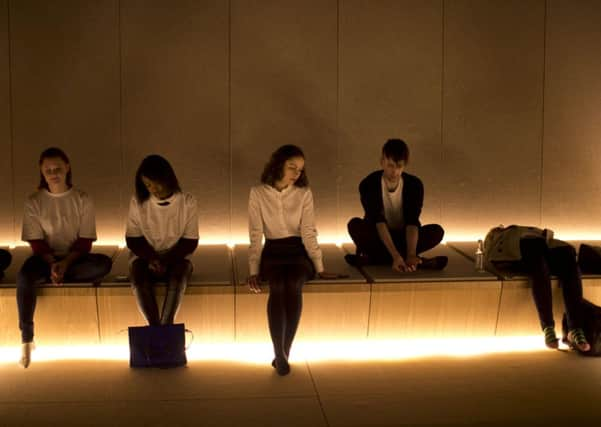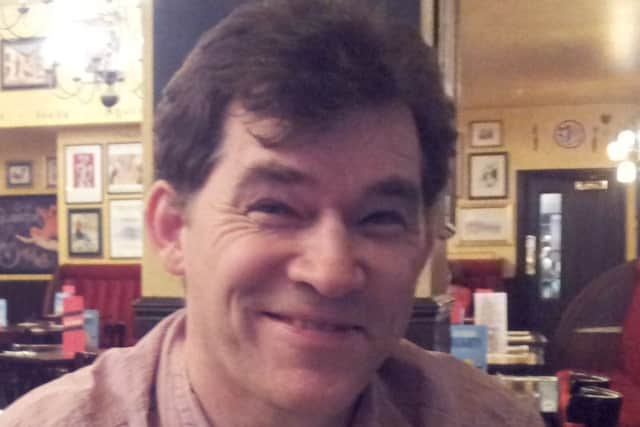Forget the rat race, could a slow down be the real boost the economy needs?


Everyone has heard the story about how Isaac Newton came up with the theory of gravity – an apple fell on his head as he sat beneath a tree. It was then, as the eminent scientist was doing nothing in particular, that his lightning bolt moment happened.
According to one Leeds University academic, there’s more to be learned from the story of Newton’s discovery. Doing nothing, says psychologist Dr Steve Taylor, is good for our mental health, but these days it’s not something most of us have time for.
Advertisement
Hide AdAdvertisement
Hide AdThanks to the proliferation of mobile phone technology, most of us manage to fill every waking second with some kind of distraction. Half the population walks along the pavement with their eyes glued to their mobiles, joggers are invariably hooked up to music players and even when we are relaxing in front of the television, our portal to the world wide web is only ever a touchscreen away.


This is now. In the future, there’s going to be even more pressure to be part of the collective mindscape. But Dr Taylor believes it’s an obsession which is damaging our creative urge. And the author of several books on psychology and spirituality, including The Fall, Out of the Darkness, Waking From Sleep and Back to Sanity, wants us all to do a little bit less in 2014.
The father-of-three said: “If you rush, you miss out on life. What we end up doing is spending all our time rushing to the future, instead of living in the moment.
“The future is just an idea in your mind. A famous philosopher once said the future is only anticipation, the past only memory. They do not really exist.If you’re busy all the time, rushing and thinking about what you need to do and where you need to go, you don’t pay any attention to your surroundings. You might be physically in the present but mentally you’re elsewhere. You spend all you time doing, but not being.
Advertisement
Hide AdAdvertisement
Hide Ad“Slowing down – and on occasion doing nothing – is a good way of experiencing the present and making life richer and more meaningful.”
He’s not alone. Take the novelist Franz Kafka (1883-1924). Speaking about creativity and inspiration, he once remarked: “You need not leave your room. Remain sitting at your table and listen. You need not even listen, simply wait, just learn to become quiet, and still, and solitary. The world will freely offer itself to you to be unmasked. It has no choice; it will roll in ecstasy at your feet.”
As Dr Taylor points out in his book Making Time: Why Time Seems to Pass at Different Speeds, we don’t all start out yearning to be “in the future” – it’s just what happens to us as we get older.
“When we’re younger, we’re much more focused on the present, and time passes much more slowly. Our perception of time passing is related to how many impressions and experiences our minds take in.
Advertisement
Hide AdAdvertisement
Hide Ad“Children are experiencing everything for the first time, so they take in a lot more detail. That’s why, for example, when you think back to car journeys, they seem to take forever but if you make the same journey as an adult, it seems much shorter.
“As adults, the world is more familiar to us, and our perception is more automatic. So as we go about our daily lives, we don’t take in much information, because our minds are already familiar with everything. It would be very tiring for us if, everywhere we went, we took in every detail.
“That’s why going on holiday – to an unfamiliar place – is a good way to be in the moment, to experience the present, because at least to begin with you are very alert to what is around you.
“After a few days of being there, though, your mind would naturally switch off the intensity of detail. There seems to be a mechanism in our minds which does this, de-sensitising us to the intensity of new experience.”
Advertisement
Hide AdAdvertisement
Hide AdWhile this unconscious mental decision to limit the amount of data we take in enables us to focus on specific tasks, it may leave us bereft of the creative spark. But that’s something we can all change, says Dr Taylor.
“As adults, we can all make a conscious decision to increase our experience of the present, and to bring more newness in our lives. It could be simple things like taking a different route to work, travelling more and taking more slow time.”
That phrase “slow time” sums up what this is all about.
These days, we’re all so used to rushing about, multi-tasking and achieving targets, it’s easy to forget there are benefits to doing nothing. Even when we are supposedly relaxing it seems we are not, because invariably we are plugged into some kind of electronic device, accessing Facebook, Twitter or some other app designed to keep your brain alert.
“The philosopher Bertrand Russell once said that as technology increased, we would all have more leisure time,” says Dr Taylor. “It hasn’t quite worked out like that. People may have become financially richer but in terms of spare time, we have less.
Advertisement
Hide AdAdvertisement
Hide Ad“Business leaders and politicians sometimes see people as units of labour, like machines. There’s this idea that if we want to get out of the recession we all have to work even harder.
“But human beings are not machines. And in fact, working long hours is counterproductive, because it blocks creativity, which comes through when we have the free time to relax. And creativity is of more benefit to the world – or even to the economy – than so-called hard work. People are creative and innovative beings who can generate new ideas but only if you allow them to.”
He has a point. James Watt solved the problems associated with perfecting the steam engine not by sitting behind a desk but by going for a walk – at which point, the solution presented itself to him... and so began the Industrial Revolution.
“We can slow down our perception of time by relaxing, taking time out, and shifting into a mode of being rather than doing.
Advertisement
Hide AdAdvertisement
Hide Ad“There’s a concept called mindfulness, a concept that originates from Buddhism, where it’s seen as a state of wakefulness, as opposed to the normal state of sleep.
“It is linked to meditation, which is also a good way to slow down your perception of time.
“There’s a lot to be said for the old adage, ‘if you have a problem, sleep on it’. Logical thinking often doesn’t work. But if you switch off for a while, the solution will present itself to you. That’s often what happens when we allow our minds to relax, to be in the moment and not constantly rushing into the future.”
To find out more about Dr Taylor’s ideas, log onto his latest blog: http://tinyurl.com/oh5x9zb.
How to slow down and get a life
Advertisement
Hide AdAdvertisement
Hide AdFill this year with new experience. The main factor in our perception of time is how much information our minds absorb, but Dr Steve Taylor insists that despite the pressures of the outside world it is possible to take your foot off the accelerator.
Make a conscious effort to be mindful. Look at the sky, at the houses and buildings you pass.
When you eat, pay attention to the taste of the food, and chewing and swallowing.
Get up 15 minutes earlier so you don’t have to rush to work; give yourself a couple of free evenings each week when you don’t feel pressurised by activities.
Don’t spend too much time in states of absorption, such as watching TV.